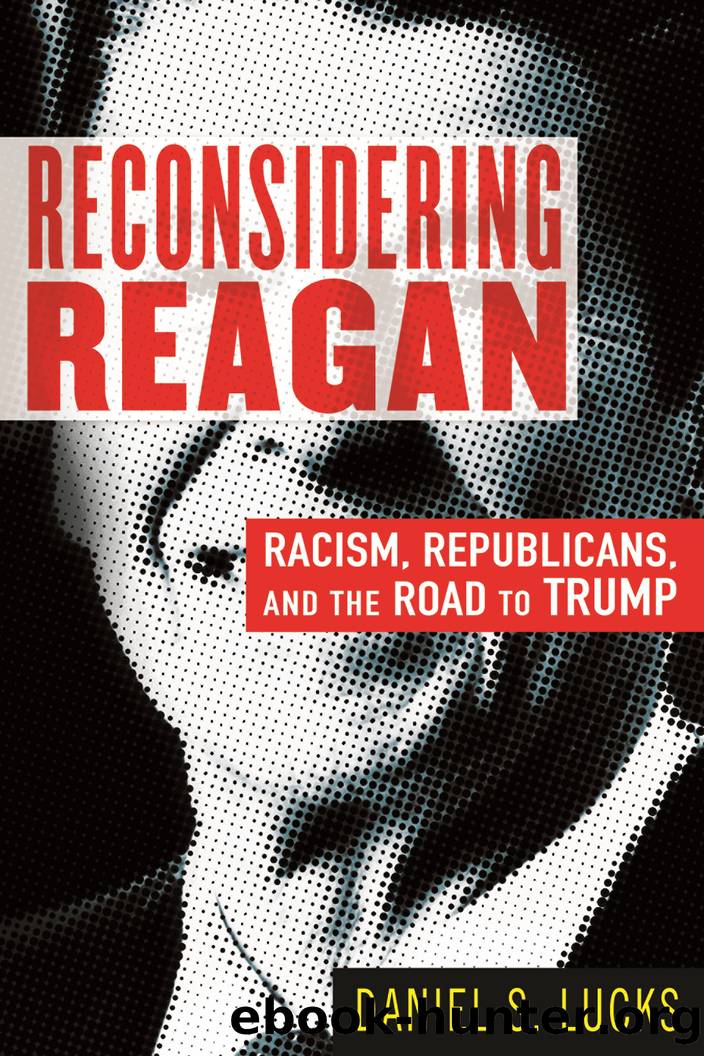Reconsidering Reagan by Daniel S. Lucks

Author:Daniel S. Lucks [Lucks, Daniel S.]
Language: eng
Format: epub
Publisher: Beacon Press
CHAPTER 10
SOUTH AFRICA
Reagan’s Embrace of the Apartheid Government and the Fight for Sanctions
I think I should say now that he is a racist, pure and simple.
—Archbishop Desmond Tutu (September 1985)1
We find under Reagan a 180-degree shift from “We shall overcome” to “We shall overturn.”
—Jesse Jackson (June 3, 1985)2
Within days of Reagan’s thumping of Mondale, the issue of Reagan’s appeasement of the racist South African government thrust the issue of apartheid to the forefront of the political debate. Televised clips of the brutal crackdown against peaceful protestors in South Africa, eerily reminiscent of the brutality seen in Alabama, Mississippi, and Georgia in the 1960s, shocked the conscience of the nation. Anger over Reagan’s support of the apartheid regime galvanized African American activists and their civil rights allies. Just two weeks after the election, a group of Black civil rights leaders formed the Free South Africa Movement (FSAM), which sought to impose sanctions on South Africa and end apartheid.3 Within days, African American despair over Reagan’s landslide victory soon gave way to the greatest wave of political mobilization since the heyday of the civil rights struggle in the 1960s around the issue of Reagan’s support of South Africa’s apartheid regime. In the face of the Reagan administration’s intransigence and demonization of the African National Congress (ANC) as pro-Soviet puppets, Black activism played a pivotal role in ending apartheid.
CONSTRUCTIVE ENGAGEMENT AND ITS DISCONTENTS
Since the end of World War II, American civil rights leaders and Black South Africans had forged political, cultural, and emotional bonds in their joint efforts to challenge white supremacy on both sides of the Atlantic.4 Just days after receiving his Nobel Peace Prize in 1964, Martin Luther King Jr. urged Western governments to withdraw their investments in South Africa. The following year, King went further and denounced South Africa’s white rulers as modern-day barbarians who had revived the racial ideology of the Nazis.5 King’s exhortations went unheeded due to American preoccupation with the Vietnam War. Until the mid-1970s, the weak insurgencies against white rule in Rhodesia, Namibia, Angola, and other countries relegated the entire South African region to a Cold War backwater.
The collapse of Portuguese colonial rule in Mozambique and Angola in 1974 thrust sub-Saharan Africa into the vortex of the Cold War. After 36,000 Cuban soldiers poured into Angola, Jimmy Carter grappled with the delicate balancing of Cold War considerations and his espousal of human rights and desire to effectuate a transition to Black majority rule in neighboring Rhodesia and Namibia. While Carter elevated the importance of human rights and criticized the racist apartheid regime in more strident tones than his predecessors, in the end, halting Soviet expansion in South Africa trumped Carter’s hatred of racism, and he refused to impose punitive sanctions.6
Unlike Carter, Reagan never wrestled with the racist brutality of the South African government. Seeing South Africa as a bulwark against the spread of Soviet influence, Reagan scoffed at Carter’s attacks on Pretoria’s human rights record. During his 1980 presidential campaign, Reagan had insisted, “South Africans certainly don’t need us to tell them how to solve their race problems.
Download
This site does not store any files on its server. We only index and link to content provided by other sites. Please contact the content providers to delete copyright contents if any and email us, we'll remove relevant links or contents immediately.
| Africa | Americas |
| Arctic & Antarctica | Asia |
| Australia & Oceania | Europe |
| Middle East | Russia |
| United States | World |
| Ancient Civilizations | Military |
| Historical Study & Educational Resources |
The Dawn of Everything by David Graeber & David Wengrow(1707)
The Bomber Mafia by Malcolm Gladwell(1622)
Facing the Mountain by Daniel James Brown(1553)
Submerged Prehistory by Benjamin Jonathan; & Clive Bonsall & Catriona Pickard & Anders Fischer(1455)
Wandering in Strange Lands by Morgan Jerkins(1430)
Tip Top by Bill James(1416)
Driving While Brown: Sheriff Joe Arpaio Versus the Latino Resistance by Terry Greene Sterling & Jude Joffe-Block(1376)
Red Roulette : An Insider's Story of Wealth, Power, Corruption, and Vengeance in Today's China (9781982156176) by Shum Desmond(1359)
Evil Geniuses: The Unmaking of America: A Recent History by Kurt Andersen(1353)
The Way of Fire and Ice: The Living Tradition of Norse Paganism by Ryan Smith(1336)
American Kompromat by Craig Unger(1315)
F*cking History by The Captain(1304)
It Was All a Lie by Stuart Stevens;(1300)
American Dreams by Unknown(1286)
Treasure Islands: Tax Havens and the Men who Stole the World by Nicholas Shaxson(1272)
Evil Geniuses by Kurt Andersen(1257)
White House Inc. by Dan Alexander(1212)
The First Conspiracy by Brad Meltzer & Josh Mensch(1174)
The Fifteen Biggest Lies about the Economy: And Everything Else the Right Doesn't Want You to Know about Taxes, Jobs, and Corporate America by Joshua Holland(1126)
